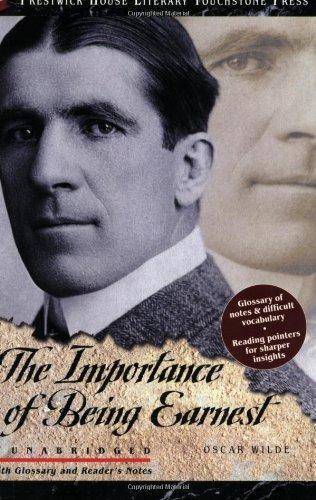aurrai ha recensito The Importance of Being Earnest di Oscar Wilde
None
5 stelle
This is my favourite play and the one that taught me I could like plays. A sample of the text:
JACK.
You really love me, Gwendolen?
GWENDOLEN.
Passionately!
JACK.
Darling! You don’t know how happy you’ve made me.
GWENDOLEN.
My own Ernest!
JACK.
But you don’t really mean to say that you couldn’t love me if my name wasn’t Ernest?
GWENDOLEN.
But your name is Ernest.
JACK.
Yes, I know it is. But supposing it was something else? Do you mean to say you couldn’t love me then?
GWENDOLEN.
[Glibly.] Ah! that is clearly a metaphysical speculation, and like most metaphysical speculations has very little reference at all to the actual facts of real life, as we know them.
JACK.
Personally, darling, to speak quite candidly, I don’t much care about the name of Ernest . . . I don’t think the name suits me at all.
GWENDOLEN.
It suits …
This is my favourite play and the one that taught me I could like plays. A sample of the text:
JACK.
You really love me, Gwendolen?
GWENDOLEN.
Passionately!
JACK.
Darling! You don’t know how happy you’ve made me.
GWENDOLEN.
My own Ernest!
JACK.
But you don’t really mean to say that you couldn’t love me if my name wasn’t Ernest?
GWENDOLEN.
But your name is Ernest.
JACK.
Yes, I know it is. But supposing it was something else? Do you mean to say you couldn’t love me then?
GWENDOLEN.
[Glibly.] Ah! that is clearly a metaphysical speculation, and like most metaphysical speculations has very little reference at all to the actual facts of real life, as we know them.
JACK.
Personally, darling, to speak quite candidly, I don’t much care about the name of Ernest . . . I don’t think the name suits me at all.
GWENDOLEN.
It suits you perfectly. It is a divine name. It has a music of its own. It produces vibrations.
JACK.
Well, really, Gwendolen, I must say that I think there are lots of other much nicer names. I think Jack, for instance, a charming name.
GWENDOLEN.
Jack? . . . No, there is very little music in the name Jack, if any at all, indeed. It does not thrill. It produces absolutely no vibrations . . . I have known several Jacks, and they all, without exception, were more than usually plain. Besides, Jack is a notorious domesticity for John! And I pity any woman who is married to a man called John. She would probably never be allowed to know the entrancing pleasure of a single moment’s solitude. The only really safe name is Ernest.




